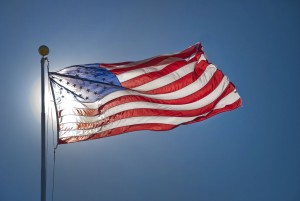What Makes An American?

As the Fourth of July rapidly approaches, red, white, and blue banners (as well as hundreds of tacky Independence Day-themed advertisements for bars and nightclubs) seem to be everywhere in our nation’s capital. While patriotic fireworks and large quantities of alcohol tend to mark the way we celebrate our country’s independence on this special day, discussions regarding patriotism and the American identity reveal disagreement on just what and who we’re celebrating.
Coming from conservative Texas, I’ve heard more than my fair share of xenophobic remarks regarding immigrants and other communities that weren’t seen as authentically “American.” But what exactly do Americans think constitutes being American?
According to a recent Public Religion Research Institute survey, several factors contribute to making a person seem distinctly American. By far the most important factor according to the study is the ability to speak English, with 89 percent of participants saying this was necessary for a person to be considered truly American. This is a bit of strange, considering that our country does not maintain English as our official language and because we have more Spanish speakers than any country in the world excluding Mexico (but including Spain).
Another strange finding was that 58 percent of respondents said being born in the United States is a requirement to be considered a real American. Sadly, this means that only 42 percent of people recognize and respect our country’s proud history as a nation of immigrants.
But strangest of all was the survey’s findings on the relationship between religious belief and American identity. Sixty-nine percent of those surveyed said that a belief in God is required to be a true American, while 53 percent believe only Christians can be true Americans.
There are a few ways to look at these numbers. On a positive note, 31 percent of Americans don’t make a connection between religious beliefs and American identity, which is a higher number than the roughly 23 percent of Americans who are religiously unaffiliated. That means there are a significant number of Americans who maintain a belief in a god or gods, but who don’t see their religion, or any religion for that matter, as a prerequisite for being considered an American. And while nearly 71 percent of Americans identify as Christian, only half of those surveyed think that being specifically Christian is a fundamental part of being an American.
Still, these numbers do seem to show that for a significant amount of Americans, religious beliefs, and a specific type of religious belief at that, are required for an individual to be considered an American. By doing so, many of those surveyed alienated Jews, Muslims, Hindus, and Buddhists, as well as humanists and atheists, from a community that is ostensibly open to all regardless of religious beliefs.
Our nation has a proud history of religious diversity, but this survey shows that many Americans are either unaware of that history or are opposed to the values that made this country what it is today. As the growth of the nonreligious continues, it’s unlikely that religion will continue to remain so intertwined with American identity. But until that day arrives, it’s crucially important that attempts to wed patriotism with religious belief and with perceptions of national identity be exposed both as theocratically intolerant and historically inaccurate.
